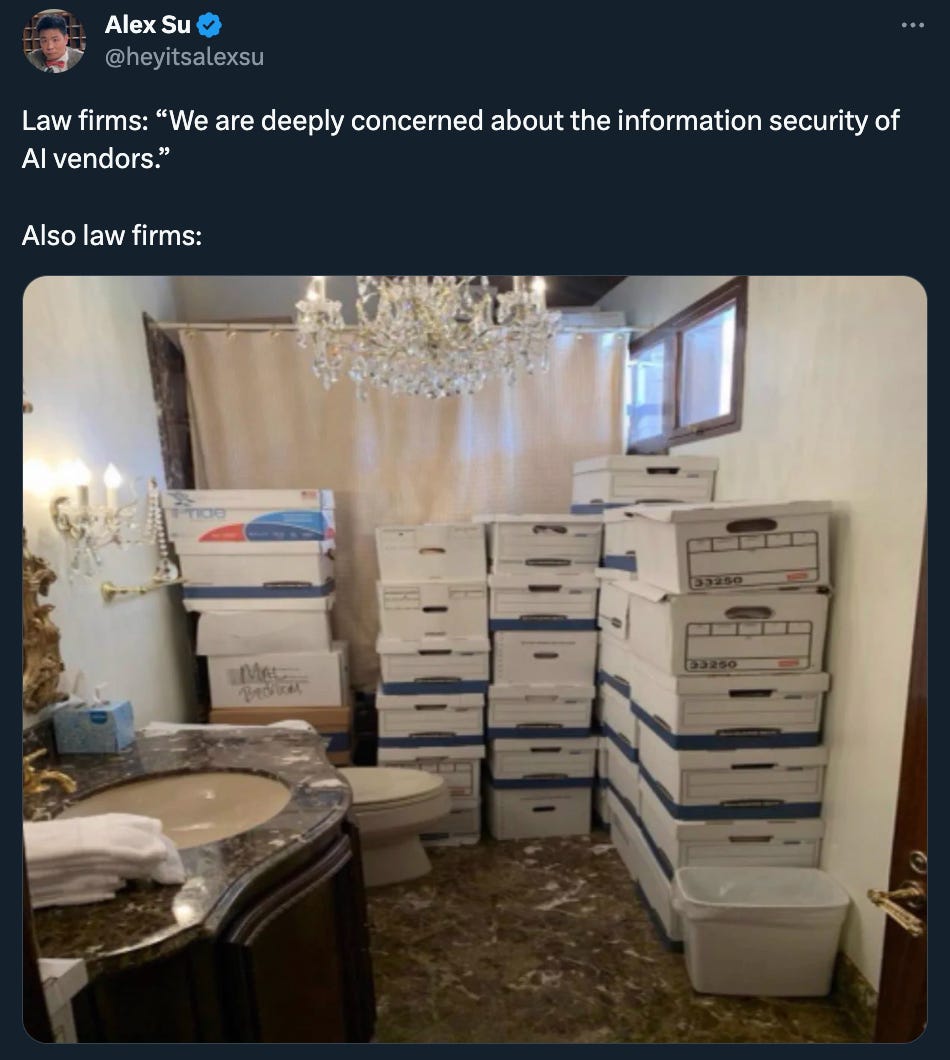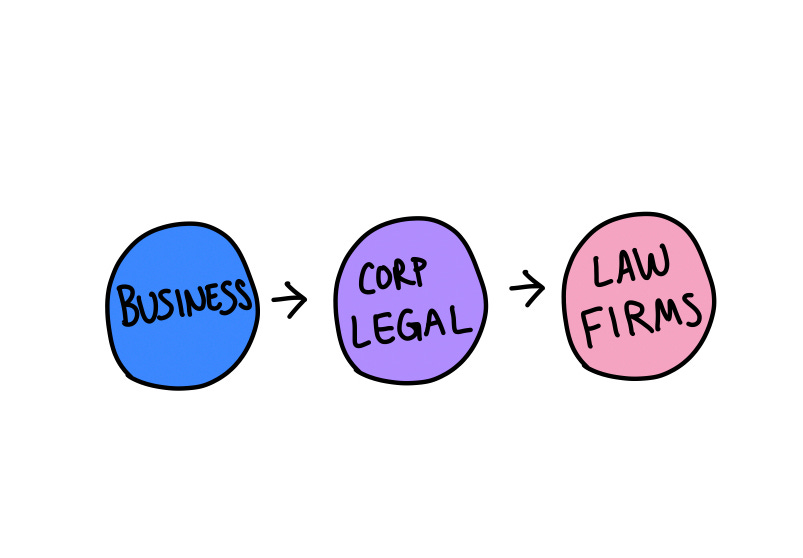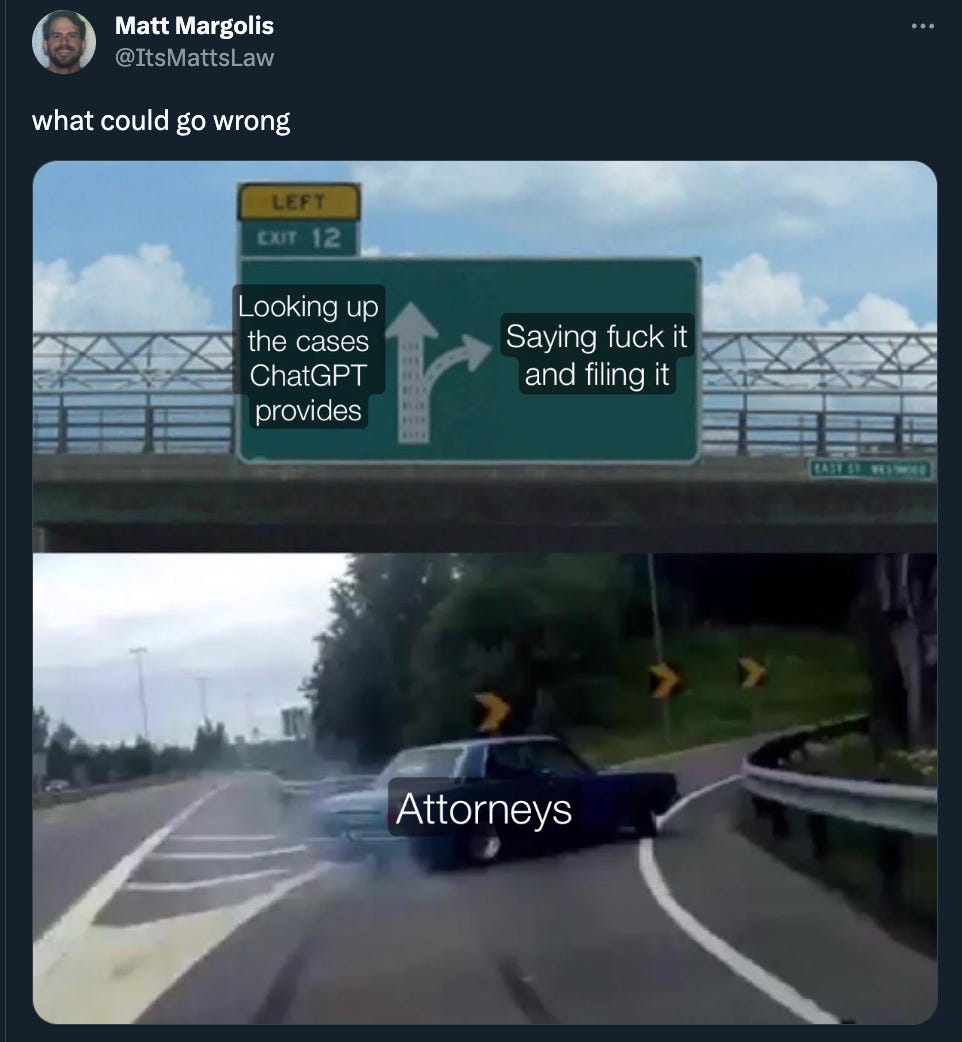The lawyers are leaning into AI
Despite all the gloom and doom, corporate legal and law firms are both embracing generative AI much more quickly than previous technologies
Recently I’ve been thinking about how law firms have embraced generative AI much more quickly than other technologies. Two related data points I noticed this week:
Chief legal officers recognizing the transformative impact generative AI will have on the businesses they support, and the practical concerns related to it. Earlier this week Ironclad hosted a webinar with heads of legal from Asana, JLL, and Twilio who basically said if they don’t find a way to lean into AI, their client (the business) will just go around them and create even bigger risks.1
Major law firms are announcing that they’ve created their own internal versions of ChatGPT. This week, both Dentons and Addleshaw Goddard announced that they’re launching secure chatbots based on GPT technology. Relatedly, I’ve know of at least one other Biglaw firm that’s already has their GPT-powered chatbot up and running for months.
When I first heard law firms announcing that they were adopting AI, I was skeptical. Anyone can announce a partnership or selection/piloting of an AI vendor. It’s good PR, and doesn’t mean that the firm has truly embraced AI. But when they create their own GPT-powered tool—that feels different. Setting aside whether it’s a good idea to build your own vs. buy, it certainly feels like a real investment, especially since the firms are dedicating significant internal resources to it.
Today I’ll discuss why generative AI is diffusing across law firms much more quickly than expected.
The business is focused on upside
Lawyers are essentially risk managers who always think about what could go wrong. That’s why when new technology comes out, law firms and legal departments typically lag behind. Most of the corporate world, on the other hand, focuses on how new technology can provide opportunity.
Part of this is because they are accountable for business results in a highly competitive environment. Law firms don’t face that same pressure because they operate in a self-regulated industry where it’s very difficult for competitors to enter the market.2 That’s why firms often have the “luxury” to take hyper risk averse stances on technology.
Corporate legal sits somewhere in between the business and the law firms. They are risk managers, but also have to be practical to meet the needs of the businesses they support. That’s why each of these segments responds to new technology differently.
You can tell by the way each of these groups reacted to the most recent innovation that made waves in the business world: the cloud. This “move” to the cloud—that first emerged some 20 years ago—was embraced quickly by companies because it unlocked so much value. Corporate legal and law firms proceeded more cautiously—and in fact, some law firms still avoid the cloud completely.3
Generative AI adoption isn’t following the same pattern as cloud adoption
My view on technology diffusion in the law firm world is based on my experience selling cloud e-discovery software to them. When the generative AI wave first landed, my immediate reaction was that AI would follow the same exact pattern. Earlier this year, I shared in my article How AI Will Cross The Legal Chasm:
I believe that widespread AI adoption will hit legal departments first, then small firms, then Biglaw. And it’s all going to take a little bit longer than we might expect.
In the five months since, I’ve come to realize that this time it’s slightly different. Yes, corporate legal is moving faster, but law firms are moving quickly too. It’s now clear to me that they’re leaning into generative AI more than they did for the cloud. They’re not all creating their own tools—many are using outside vendors—but whatever the approach, it seems like almost everyone is incorporating the tech into their stack.4
Why is it different this time?
Here’s my guess: Previous technological waves, like the move to the cloud, didn’t really affect how substantive legal work was done. Sure, the cloud enabled new law-specific applications to be built and deployed quickly. But those applications didn’t touch the core of what the lawyers did.5 So when the cloud made its way through the business world, legal kept a safe distance away and remained relatively untouched.
Generative AI, on the other hand, promises to revolutionize the actual substance of a lawyer’s job. It can summarize large swaths of information. It can draft documents from scratch. It can propose contract redlines based on your playbook.6 This type of work is legal’s core competency. It can be re-imagined. The business is aware, so they’ve been pressuring corporate legal to find ways use AI to create operational efficiencies.7
Feeling the pressure to jump on the AI bandwagon
That pressure has now moved downstream to law firms. I don’t actually know how the pressure trickles down. It could be corporate legal requiring firms to use AI. Or it could be something subtle, like a GC casually asking outside counsel how they plan to use generative AI. Or it could be law firms being proactive and trying to get ahead of the AI wave. Whatever it is, however it works—there is pressure moving down to the firms.
Everything is being driven by pragmatic concerns. It’s not just firms aligning themselves with clients on AI. It’s also the recognition that employees will use AI no matter what—and they might do it in an unsafe, risky way. I imagine many law firm associates have used ChatGPT for sensitive client matters. So when firms create their own GPT tool, that curbs “rogue usage”8 of unsafe AI, plus it creates alignment with their clients—corporate legal.
This all played out very differently during the move to the cloud.9 It’s all moving much faster than I thought it would.10
Despite all this movement by law firms, I still do believe that most firms will wait on the sidelines. Some will watch quietly, and wait for the right time to bring AI into their organization. Others will adamantly oppose generative AI and bang the drum on why the risks outweigh the benefits. Especially if the opposition is based on economic concerns.11
Being a late adopter is a mistake though. Especially right now, in a world where there are so many new and unprecedented competitive forces being exerted on incumbent law firms. Not only is there AI, there’s also AI-powered outside counsel management technologies, flexible talent platforms & marketplaces, and corporate legal ops that is driving CLOs to use low cost providers to get work done. Not to mention all of the rising small & regional firms that are taking market share from incumbents.
Meanwhile, the rest of the world continues to lean into generative AI. Especially the business world, where there is so much to gain. The most pragmatic lawyers will follow along to avoid being cut out completely. That’s what we’re seeing with corporate legal, and what I expect to see with traditional Biglaw firms diving headfirst into bringing GPT technology in. The laggards will all be left behind.
It’s a super interesting time for legal tech.
Thanks for reading! This is a free weekly email for Off The Record subscribers. If you’re interested in learning more about sales, marketing, and business development, consider upgrading to a paid subscription, which gives you full access to premium content.
I shared a brief summary of the takeaways from this fantastic panel on LinkedIn. You can find it here.
Although historically law firms have had no competition due to strict rules on who can practice law, things are changing. Some states have opened the door to non-lawyer ownership of firms, and flexible talent marketplaces and providers have been moving into this space—creating options for corporate clients. Plus, the emergence of legal operations, a function dedicated to vetting out the best provider to get the job done means that the protections law firms historically have enjoyed are eroding quickly.
A surprising number of successful legal tech companies that target law firms that deploy on-premise software only. To me this is evidence that firms are still very conservative when it comes to cloud software—even if some of them have adopted cloud software for specific uses.
On Friday, Legal Tech News dropped an interview with Sarah Alt, Chief Process & AI Officer at Biglaw firm Michael Best, which apparently issued a firm-wide ChatGPT ban. She provided an explanation for the ban, and how the firm is thinking about AI. This stands as a sharp contrast to how firms treated the cloud, where if there was a ban—that was the end of it. Here, Alt described how the firm is thinking about AI. The ban is actually part of a more careful approach to AI. I’m not sure I believe this is the best approach but it’s certainly thoughtful and very different than how firms treated the cloud. Her full quote:
What this [ChatGPT] block also afforded us is the breathing room to establish a safe sandbox where we can leverage the capabilities of ChatGPT and other GPT models without the added risk of the data going back into [public access] models. It’s also afforded us the attention to focus on the relationships that we have with vendors and suppliers who are bringing ChatGPT API capabilities through through their applications. So it’s allowing us to do is still take advantage of the power of [the technology] without it needing to be in the [public access] model.
Most applications had to do with document management (e.g. Box, Dropbox) or practice management (e.g. Clio). These are backoffice functions. Sure, during the later stages of the cloud revolution, applications that touched core legal work started to emerge (e.g. contract management). But even then, the tech didn’t completely transform a lawyer’s job.
Its ability to do so much of legal work has quickly revealed some truths about how the legal profession *truly* operates. I’ve written about this before, but essentially it’s become obvious how prevalent cutting corners and gatekeeping information is.
The pressure isn’t exactly an overt demand, I don’t think. But it still exists in some shape or form. I have heard, off the record, that there’s a widespread trend of CEOs asking all of their executives—which includes chief legal officers—how they can use AI to streamline operations in the functions they oversee.
When I worked in e-discovery sales we had a term for associates who went around their IT departments and purchased cloud software for one off use: Rogue Associates. These early adopters took risks to deliver value for their clients, and their firms—precisely because they were so concerned about data security worries that never materialized—were often many steps behind.
For further reading on why ChatGPT and GPT-powered technology is different, check out my article from earlier this year ChatGPT Betrays The Lawyers
A few months ago I implied that law firms would be slow to adopt AI because compared to the other players in the ecosystem, they’re too focused on the downsides: “Law firm lawyers specialize in identifying risks. And the problem with hallucinations is very real. So of course the risks will jump out to them. It’s all they can see.”
For further reading on AI’s economic impact, I would check out this wonderful article from the 3 Geeks And A Law Blog titled AI-Pocalypse: The Shocking Impact on Law Firm Profitability






All of the points above are valid, and here are two more factors that will also accelerate the adoption of generative AI:
1/ It is not easy for humans (or even machines for that matter) to tell whether a media artifact (text, image, audio, video, computer code, etc.) was generated by AI. This in turn will make it very challenging to effectively enforce any generative AI ban. If one cannot recognize the "enemies", how can one stop them from entering the gate?
2/ Previous information technologies are mostly advances in how information is stored and/or transmitted: from the telegraph and telephone to the Internet and the cloud. On the other hand, generative AI is a tool for creating information, and stopping the spread of information is much harder than banning its medium. You can ask your clients or opposing counsel to send a fax because your firm doesn't want anything to do with the cloud, but there's nothing you can do if the content of that fax didn't come out of a human's brain. History has shown that most attempts at preventing the spread of information and ideas are ineffective: one can ban or even destroy the medium (burn books, censor the Internet, etc.); God forbid, one can even "interfere" with the messenger. But sooner or later, information and ideas will still spread through alternative messengers and media.
These unique characteristics of generative AI completely set it apart from previous breakthroughs. As generative AI becomes more sophisticated over time, it will only become increasingly difficult for late adopters to slow its spread.
A few comments.
1) "They are accountable for business results in a highly competitive environment.." Absolutely. This is really what it is all about. Since Generative AI has shown its power in many different ways, firms have seen that they need to start investing in it and using it or risk being seen as not as "up to date" as other firms.
2) We have a long ways to go when it comes unlocking AI's full potential. It's early days and experimentation is the name of the game right now. Test, learn, repeat.
3) AI, like any technology created by imperfect humans, is imperfect. It can learn and get better faster than a human though, right the right data, the right amount of time, and the right focus.